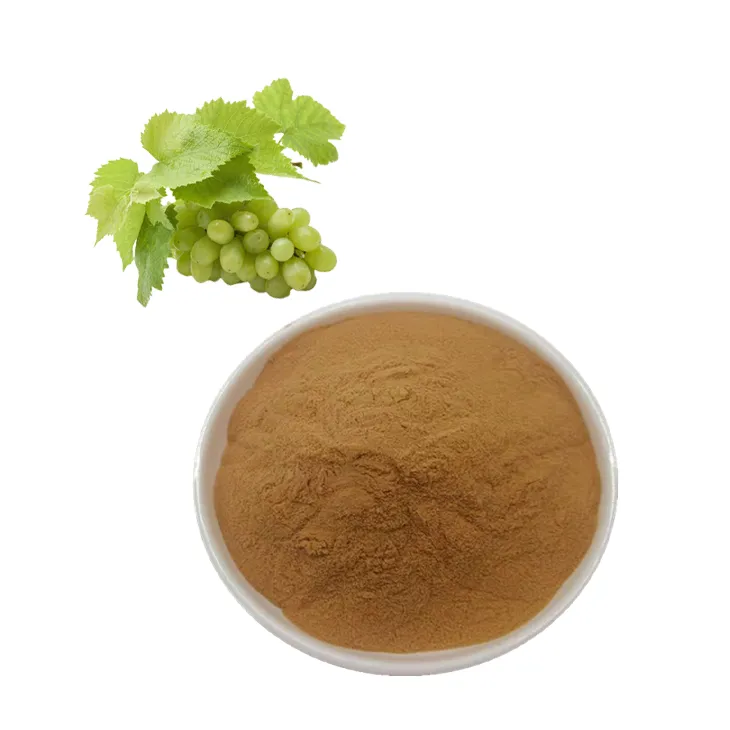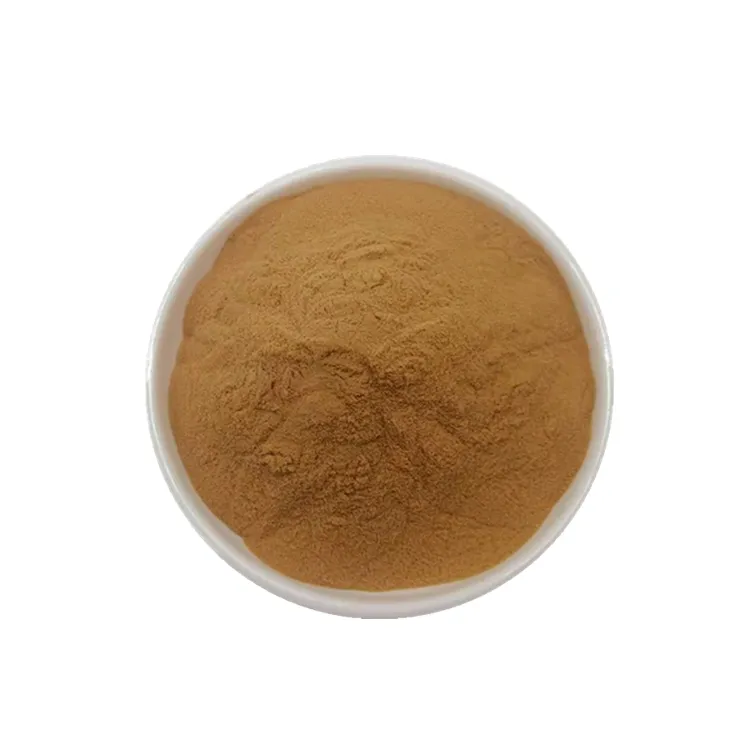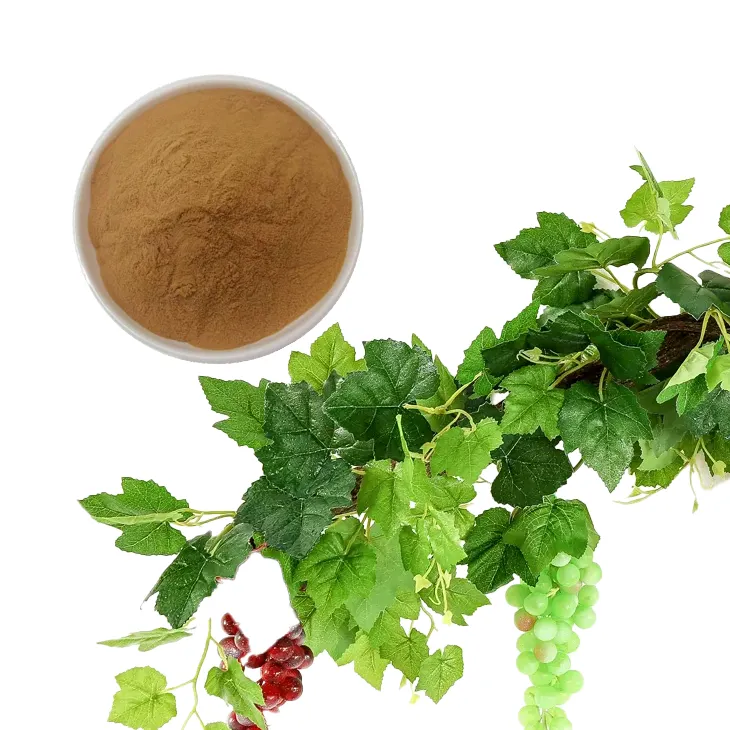- 0086-571-85302990
- sales@greenskybio.com
Grape Leaf Extract: Is the Extract Effective for Weight Loss?
2024-11-13

1. Introduction
In the quest for effective weight - loss solutions, many people are turning to natural products. Grape Leaf Extract has emerged as a potential candidate in the field of weight management. This article aims to comprehensively analyze whether Grape Leaf Extract can actually contribute to weight loss by examining scientific research, understanding its possible mechanisms, and comparing it with other weight - loss aids.

2. Understanding Grape Leaf Extract
2.1 What is Grape Leaf Extract?
Grape leaf extract is derived from the leaves of grapevines. Grapes have long been known for their various health benefits, and it is becoming increasingly clear that the leaves also possess valuable properties. The extract contains a variety of bioactive compounds, such as flavonoids, phenolic acids, and tannins. These compounds are thought to be responsible for many of the potential health effects associated with grape leaf extract.2.2 Traditional and Modern Uses
Traditionally, grape leaves have been used in some cultures for culinary purposes, such as in the preparation of stuffed grape leaves. In modern times, the extract has been studied for its potential medicinal properties, including anti - inflammatory, antioxidant, and anti - diabetic effects. However, its role in weight loss is a relatively new area of research.
3. Scientific Research on Grape Leaf Extract and Weight Loss
3.1 Animal Studies
Several animal studies have been conducted to investigate the effects of grape leaf extract on weight. In some rodent models, it has been observed that grape leaf extract supplementation can lead to a reduction in body weight gain. For example, in a study where rats were fed a high - fat diet along with grape leaf extract, the rats in the extract - supplemented group showed a lower increase in body weight compared to those in the control group. This was accompanied by changes in body composition, with a tendency towards reduced fat mass.3.2 Human Studies
Human studies on grape leaf extract and weight loss are still relatively limited. However, some preliminary research has shown promising results. In a small - scale clinical trial, participants who took a grape leaf extract supplement for a certain period reported a slight decrease in body weight. Additionally, some markers related to metabolism, such as basal metabolic rate, showed a tendency to improve. But more large - scale and long - term human studies are needed to confirm these initial findings.
4. Possible Mechanisms of Action
4.1 Impact on Metabolism
One of the proposed mechanisms by which grape leaf extract may contribute to weight loss is through its effect on metabolism. The bioactive compounds in the extract may interact with the body's metabolic pathways. For instance, some flavonoids in the extract could potentially enhance mitochondrial function. Mitochondria are the powerhouses of the cells and play a crucial role in energy production. By improving mitochondrial function, the body may be able to burn more calories at rest, thus contributing to weight loss.4.2 Influence on Appetite
Another possible mechanism is its influence on appetite. There is evidence to suggest that grape leaf extract may affect the hormones and neural signals that regulate appetite. It could potentially reduce feelings of hunger or increase feelings of satiety. This might lead to a decrease in overall calorie intake, which is a key factor in weight management. For example, some studies have shown that certain compounds in grape leaf extract can interact with the receptors in the gut that are involved in sending signals to the brain about hunger and fullness.5. Comparison with Other Weight - Loss Aids
5.1 Prescription Weight - Loss Drugs
Prescription weight - loss drugs, such as phentermine - topiramate and liraglutide, have been shown to be effective in promoting weight loss. However, they often come with potential side effects. Grape leaf extract, on the other hand, is a natural product. While its weight - loss effects may not be as dramatic as those of prescription drugs, it may offer a safer alternative for those who are looking for a more natural approach to weight management.5.2 Over - the - Counter Supplements
There are numerous over - the - counter weight - loss supplements on the market, such as Green Tea Extract and Garcinia cambogia. Green Tea Extract is known for its thermogenic properties, which can increase calorie burning. Garcinia cambogia is believed to suppress appetite. Grape leaf extract shares some similarities with these supplements in terms of potential mechanisms, but it also has its own unique set of bioactive compounds. Each supplement may work differently for different individuals, and more research is needed to determine which one is the most effective for weight loss.6. Considerations and Precautions
6.1 Dosage and Safety
When considering using grape leaf extract for weight loss, it is important to pay attention to dosage. While there is no established standard dosage for weight - loss purposes, excessive intake of any supplement can be harmful. Some people may experience side effects such as gastrointestinal discomfort if they take too much grape leaf extract. It is also important to ensure that the extract is sourced from a reliable and quality - controlled provider.6.2 Interaction with Medications
Grape leaf extract may interact with certain medications. For example, if a person is taking medications for diabetes or blood pressure, the extract could potentially interfere with the effectiveness of these medications or cause unexpected side effects. Therefore, it is crucial to consult a healthcare provider before starting to take grape leaf extract, especially if one is already on other medications.7. Conclusion
In conclusion, grape leaf extract shows some potential in the area of weight loss. The scientific research, although still in its early stages, has provided some evidence of its possible effects on body weight and related factors. The proposed mechanisms of action, such as its impact on metabolism and appetite, are also quite promising. However, compared to more established weight - loss aids, more research is needed to fully understand its effectiveness and safety. For those interested in using grape leaf extract for weight loss, it is essential to approach it with caution, taking into account factors such as dosage, safety, and potential interactions with medications. With further research, grape leaf extract may or may not prove to be a key to the slimming journey, but it is definitely a natural product worthy of further exploration in the context of weight management.
FAQ:
What is grape leaf extract?
Grape leaf extract is a substance obtained from grape leaves. It contains various bioactive compounds such as flavonoids, phenolic acids, and tannins. These compounds are thought to have potential health benefits, which is why it's being explored in relation to weight loss among other things.
How might grape leaf extract affect metabolism?
Some research suggests that the bioactive compounds in grape leaf extract may influence metabolic processes. For example, flavonoids could potentially enhance mitochondrial function, which is crucial for energy production in cells. This improved energy production might lead to a more efficient metabolism, where the body burns calories more effectively. However, more research is still needed to fully understand this mechanism.
Can grape leaf extract suppress appetite?
There is some indication that grape leaf extract may play a role in appetite suppression. It could potentially interact with hormones or neurotransmitters in the body that are related to hunger and satiety. However, the evidence for this is not yet conclusive, and it may vary from person to person depending on factors such as overall diet, lifestyle, and individual body chemistry.
Is grape leaf extract safer than other weight - loss aids?
Grape leaf extract is generally considered to be a natural product, which may give the impression of being safer compared to some synthetic weight - loss aids. However, it's important to note that natural does not always mean completely safe. While there are no widespread reports of severe side effects associated with grape leaf extract specifically for weight loss, more research is required to determine its long - term safety. Also, some people may be allergic to components in the extract.
How should grape leaf extract be consumed for potential weight loss?
There is no standardized method of consuming grape leaf extract for weight loss yet. It may be available in supplement form, but the appropriate dosage would depend on various factors such as age, health status, and individual response. It's crucial to consult a healthcare professional before starting any new supplement regimen, especially for the purpose of weight loss.
Related literature
- Title: The Bioactive Compounds in Grape Leaf Extract and Their Potential Health Effects"
- Title: "Metabolic Effects of Plant - Based Extracts: A Focus on Grape Leaf Extract"
- Title: "Appetite Regulation and Natural Supplements: The Role of Grape Leaf Extract"
- ▶ Hesperidin
- ▶ Citrus Bioflavonoids
- ▶ Plant Extract
- ▶ lycopene
- ▶ Diosmin
- ▶ Grape seed extract
- ▶ Sea buckthorn Juice Powder
- ▶ Fruit Juice Powder
- ▶ Hops Extract
- ▶ Artichoke Extract
- ▶ Mushroom extract
- ▶ Astaxanthin
- ▶ Green Tea Extract
- ▶ Curcumin
- ▶ Horse Chestnut Extract
- ▶ Other Product
- ▶ Boswellia Serrata Extract
- ▶ Resveratrol
- ▶ Marigold Extract
- ▶ Grape Leaf Extract
- ▶ New Product
- ▶ Aminolevulinic acid
- ▶ Cranberry Extract
- ▶ Red Yeast Rice
- ▶ Red Wine Extract
-
Green Tea Extract
2024-11-13
-
Citrus Aurantii Extract
2024-11-13
-
Senna Leaf Extract
2024-11-13
-
Mulberry leaf Extract
2024-11-13
-
Reishi mushroom extract
2024-11-13
-
Lycopene
2024-11-13
-
White Willow Bark Extract
2024-11-13
-
Dandelion Leaf Extract
2024-11-13
-
Mangosteen extract powder
2024-11-13
-
Natural grape seed extract
2024-11-13





















